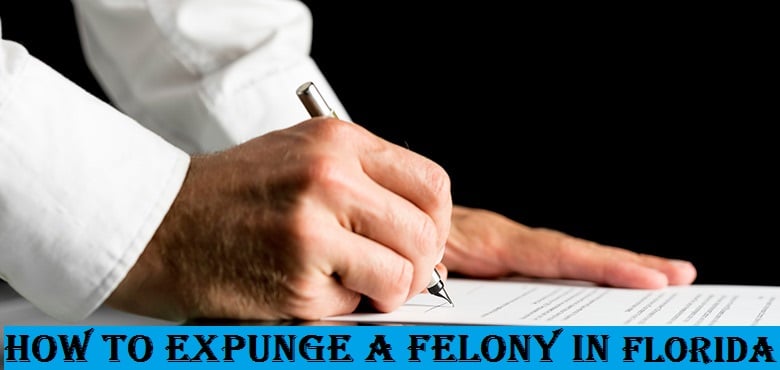Florida grants background checkers easy access to criminal records.
This relative ease is bad news for persons with an offense on their records. Felons’ chances of securing a good apartment, decent job, and educational scholarship are significantly dependent on their background check reports.
According to Florida laws, only individuals without convictions can seal or expunge their records.
Sealing or expungement offers one-time criminals an opportunity for a fresh start. While this may be time- and cost-consuming, ultimately, the investment is well worth it.
If you meet the eligibility requirements as spelled in the Florida constitution, you can strike off those demeaning errors and avoid the long-life implications.
Florida Statutes make provision for expungement and sealing of criminal records in Section 943.059 and 943.0585. These statutes may be somewhat too technical for inexperienced legal experts to understand. An experienced attorney may come handy here.
Sealing and Expungement Requirements in Florida

Expungement or sealing of criminal records involves a range of requirements.
Firstly, a petitioner must have a “Certificate Of Eligibility” – COE for short. Before you can proceed with your expungement or sealing application, you must have obtained this legal from FDLE (Florida Dept. of Law Enforcement.)
Although you can request for the COE without any legal assistance, most failed expungement requests are traceable to improper or incomplete filing of the COE application.
Noteworthily, obtaining and completion of the eligibility certificate is arguably the most time-consuming step in the application process.
Even worse, if an application is declined for wrongful filing, you may need to wait for 4 to 6 months before you can begin the process all over.
Again, confirm your expungement eligibility before you begin the process.
If you have ever been found guilty of a criminal offense – whether traffic infractions, minor violations, and misdemeanor – Florida State forbids you the right to felony expungement or sealing. Little wonder why Florida is considered top among states with the most stringent rules for record expungement and sealing.
In Florida, expungement is granted only to those who were arrested but not convicted or for criminal cases sealed for at least ten years.
In Florida, typically, expungement takes up to 7 months. On average, you spend around $900 for the services of an expungement attorney.
However, some attorneys grant their clients a money-back guarantee in the event the judge denies your expungement petition.
If your chief reason for an expungement request is to restore your firearm rights, it requires entirely different legal procedures.
Difference Between Expungement and Sealing
It is essential to understand the difference between expungement and sealing.
Unlike an expungement, the path to sealing a record seems a lot faster and with fewer demands from the State Attorney who may want to challenge your expungement petition.
Also, an expungement is only applicable to charges entirely dismissed by the judge or prosecutor. This may sometimes involve Pretrial intervention/Deferred Prosecution or Pretrial diversion.
For cases not dismissed, those with a no contest or guilty plea, or convicted after trial (whether you got a withhold of adjudication or not), then you are ineligible for an expungement. There are no exceptions.
Again, if you ever got a conviction, and with a withhold of adjudication, you can seal a range of charges.
Since some charges are not eligible for sealing, you may need to be sure you qualify before making any financial commitments and related efforts.
However, in practice, both expungement and sealing offer related effects most felons seek – restricting public access to criminal records.
The expungement, however, does more than merely sealing up records. It destroys the files – even though the FDLE keeps a secret record.
But sealing of records will do you a lot good for employment, housing, education, and related purposes. In fact, record sealing might be the only available option for you, since an expungement is pretty much a ‘holy grail’ in Florida.
It is also worth mentioning that a person can only expunge or seal one charge or arrest in Florida. Even if you get an adjudication withheld or multiple charges at different times, you will select which to seal – except the charges are offshoots of the same incident.
Felony Expungement Eligibility
First, do your homework to find out what the Florida laws say about your expungement eligibility. You stand a chance to felony expungement where the district attorney never filed your charges formally, your case had been dropped/dismissed, or if the court finds you not guilty.
You may also obtain an expungement on completion of court-ordered sentences or by a guilty plea.
Conversely, you automatically disqualify for an expungement in Florida if you’ve had a conviction or multiple charges/arrest on your record. Florida law prohibits more than one expungement.
That said, cases not eligible for expungement – even with a guilty plea – includes:
- Battery
- Child abuse
- Carjacking
- Sexual violations
- Illegal use of explosives
- Homicide
- Prostitution
- Home invasion robbery
- Kidnapping
- Drug trafficking
- Domestic violence
- Arson
Of course, a successful felony expungement in Florida opens you to a new world of opportunities. You have easy access to a range of local and state government employments slots such as law enforcement and teaching.
Of course, and typical of court filings, the expungement petition comes with a fee – $75. However, besides the fee, remember you may need the assistance of experienced expungement attorneys to help with the paperwork and court presentations.
While an expert can boost your chances of success, inexperience can ruin the entire process and take you back on square one.
Frequently Asked Questions on How to Expunge a Felony in Florida

What if I reside out of state? Can I still seal or expunge my Florida arrest?
Of course, you can. If your arrest happened in Florida, you could seal or erase them from anywhere in the world. Even Florida visitors who got arrested during their stay can seek expungement on their return to their home countries.
If I pay more, can my attorney expedite the sealing or expungement process?
The attorney does not determine the pace of your sealing or expungement process. However, you can visit FDLE’s expungement online page to find out the applications they are currently on.
Can I expunge multiple charges?
Yes and No. Yes – if the charges are all from a single criminal case. If they are from different criminal episodes, only one can be sealed or expunged.
Must I appear in court during the expungement or sealing process?
You may not have to show up in court, except ordered by the trial judge. However, most attorneys will require their clients to appear during formal hearings. This shows how much value the process is to you.
What are the steps involved in expunging or sealing criminal records?
First, the Florida Department of Law Enforcement must offer you a Certificate of Eligibility as a proof of application approval.
You will – most likely with the aid of an experienced attorney – prepare and submit a petition to expunge or seal to the court.
Following the formal filing, the court either rules on the expungement petition without a court hearing, or fixes a date for the hearing. Ultimately, the court either grants or denies expungement approval.
Where the court rules in support of the petitioner to grant the expungement or sealing, the judge will sign an expungement order.
The court order to expunge or seal one’s records is distributed to the law enforcement agency and related agencies that have a direct or indirect interest in your files, as well as the court clerk.

I had a felony defrauding an innkeeper back 1985, they gave me fines and probation, i would like to have my record expunged after 30 plus years